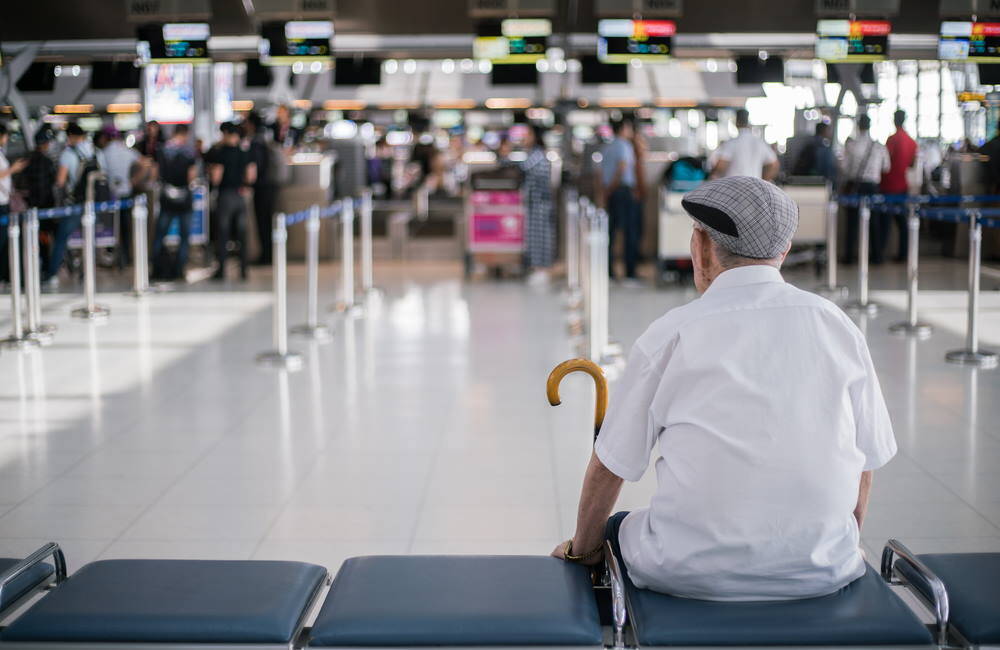It’s possible to fly with dementia, especially if they travel with a companion who helps them as they get through the airport, during the flight and after they reach their final destination. In many cases, that person is a spouse, family member or close friend.
Families also can hire a flight nurse to travel with their loved one, ensuring they have professional medical care throughout their journey. With the proper planning, professional care and attention to detail, it’s possible for someone to fly with dementia.
As The Alzheimer’s Association puts it: “Living with Alzheimer’s or another dementia does not mean it’s necessary to stop participating in meaningful activities such as travel. However, it does require planning to ensure safety, comfort and enjoyment for everyone.
Can I Hire a Nurse to Fly With Me?
Tips For Flying With Dementia
People diagnosed with dementia must make changes in their lives. But those changes do not need to include withdrawing from daily life and never traveling again. As more is known about dementia, the approach to the condition has evolved into finding ways for people to live well with dementia. That includes the ability to travel.
Any decision-making process on a person’s ability to fly with dementia needs to start with the understanding that people experience dementia at different levels. Dementia is a progressive condition. Those in the beginning stages will have far fewer difficulties than those in the latter stages. Consultation with a physician is key in this process.
Even as dementia progresses, people may need to travel for weddings, family reunions, vacations or even to see a medical specialist. If you plan to fly with someone who has dementia, here are some tips to keep in mind.
How to Buy an Airline Ticket for Someone
Take the Most Direct Route
Even if it costs more, create a flight plan that reduces or eliminates the need to change planes. Also, consider whether your loved one does better in the mornings, afternoons or evenings, and plan the flights accordingly.
Call Ahead For Information
Flight nurses make this a part of their job for every flight they take with a client. It’s especially beneficial for those who fly with dementia. Call airport officials ahead of time to find out if there are any special considerations for going through security if a person has dementia. A call to the airline also can provide information on support they offer for passengers with dementia (such as early seating).
Take The Documents You Need
Designate one carry-on bag to hold all the documents you need. This is especially important in case you become separated. The Alzheimer’s Association recommends the following:
- Name and contact information for doctor
- A list of all medications and dosages
- Contact information for police, fire, hospitals and poison control for your destination area
- A list of food allergies
- Contact information for friends and family in case of emergency
- Insurance information
- Copies of legal papers
Flying with Oxygen & Medications
Know the Warning Signs
A flight nurse always reviews a patient’s condition and becomes familiar with the details. If you decide to fly with someone with dementia, you should do the same. Know the warning signs that indicate your loved one is becoming anxious or agitated and have strategies to reduce that agitation. Never overload them with too much information.
Set Realistic Expectations
It’s important ahead of time to set realistic goals for each day of the trip, keeping things as simple and calm as possible. If you are traveling to a family reunion or vacation, know that your loved one may not be able to participate in some activities that take a long time or require complicated instructions. Know your loved ones’ limits – as well as your own.
Hire Additional Help
If it seems like traveling alone with someone with dementia is overwhelming, consider hiring a flight nurse or caregiver to help you plan for the trip, navigate the airport and safely get through the flight. An additional person with professional training can give you great peace of mind for your trip. A dementia diagnosis, while life altering, does not have to result in your loved one no longer traveling. By planning ahead, setting goals and getting help if needed, it’s possible to safely fly with dementia.
